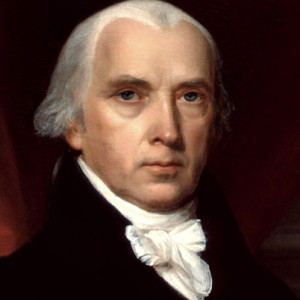The “Father of the Constitution,” James Madison, consistently supported some form of proportional representation and opposed equal state suffrage.
At the Convention, he repeatedly argued against equal state suffrage in the Senate, to the point of exasperation. He won the argument on the merits, but could not retain the votes he needed. He never fully endorsed it.
- August 23, 1785: In a letter regarding a possible form of government for Kentucky, Madison discussed the difficulty which “arises from the disproportionate increase of electors in different Counties.” He recommended changing “the number of representatives allotted to them respectively,”
- April 16, 1787: In a letter to George Washington before the Convention, Madison wrote, “I would propose as the ground-work that a change be made in the principle of representation….The lesser States must in every event yield to the predominant will.” He made similar comments in letters to Jefferson and Randolph.
- May 29, 1787: The Virginia Plan, largely drafted by Madison, stated that “the rights of suffrage in the National Legislature ought to be proportioned to the Quotas of contribution, or to the number of free inhabitants…”
- May 30, 1787: Madison “observed that whatever reason might have existed for the equality of suffrage when the Union was a federal one among sovereign States, it must cease when a national Governt. should be put into the place…and there was the same reason for <different numbers> of representatives from different States, as from Counties of different extents within particular States.”
- June 7, 1787: To a proposal that Senators should be chosen by state legislatures, Madison responded that “if the motion (of Mr. Dickenson) should be agreed to, we must either depart from the doctrine of proportional representation; or admit into the Senate a very large number of members. The first is inadmissable, being evidently unjust. The second is inexpedient.”
- June 28, 1787: Madison “could neither be convinced that the rule contended for was just, nor necessary for the safety of the small States agst. the large States…”
- June 29, 1787: Madison “entreated the gentlemen representing the small States to renounce a principle wch. was confessedly unjust, which cd. never be admitted, & if admitted must infuse mortality into a Constitution which we wished to last forever.”
- June 30, 1787: Madison explained how the equal state suffrage in the Senate could warp the will of the people. The “majority of States might still injure the majority of people. 1. they could obstruct the wishes and interests of the majority. 2. they could extort measures repugnant to the wishes & interest of the Majority. 3. they could impose measures adverse thereto; as the 2d. branch will probably exercise some great powers, in which the 1st. will not participate.”
- July 5, 1787: Madison rejected the ultimately accepted deal that money bills must originate in the House in exchange for equal state suffrage in the Senate. He “could not regard the exclusive privilege of originating money bills as any concession on the side of the small States. Experience proved that it had no effect.” He also disagreed with small-state delegates who claimed that their constituents would not accept proportional representation. “The merits of the System alone can finally & effectually obtain the public suffrage. He was not apprehensive that the people of the small States would obstinately refuse to accede to a Govt. founded on just principles, and promising them substantial protection. He could not suspect that Delaware would brave the consequences of seeking her fortunes apart from the other States, rather than submit to such a Govt. much less could he suspect that she would pursue the rash policy of courting foreign support…”
- July 7, 1787: “Equality in the Senate will enable a minority to hold a majority, and to oblige them to submit to their interests, or they will withdraw their assent to measures essential and necessary to the general Good.”
- July 9, 1787: Madison suggested that “in the first branch the States should be represented according to their number of free inhabitants; And in the 2d. which had for one of its primary objects the guardianship of property, according to the whole number, including slaves.”*
- July 14, 1787: Madison “expressed his apprehensions that if the proper foundation of Governmt was destroyed, by substituting an equality in place of a proportional Representation, no <proper> superstructure would be raised.”
- February 27, 1788: In Federalist No. 62, Madison explained that his choice was between accepting equal state suffrage in the Senate and reverting to the Articles of Confederation. “A common government, with powers equal to its objects, is called for by the voice, and still more loudly by the political situation, of America. A government founded on principles more consonant to the wishes of the larger States, is not likely to be obtained from the smaller States. The only option, then, for the former, lies between the proposed government and a government still more objectionable. Under this alternative, the advice of prudence must be to embrace the lesser evil…”
Like Jefferson, Madison owned slaves and took little or no personal or political action against slavery.
*Evidence suggests that Madison made this proposal because he truly thought it was best, not because he thought it was better than equal state suffrage and the only way to avoid equal state suffrage. See also here and here and here.
